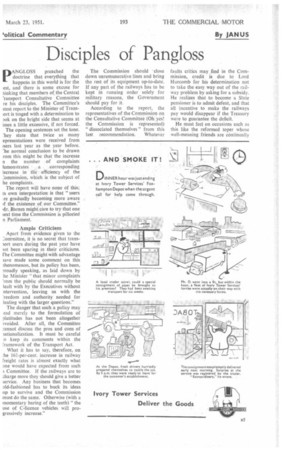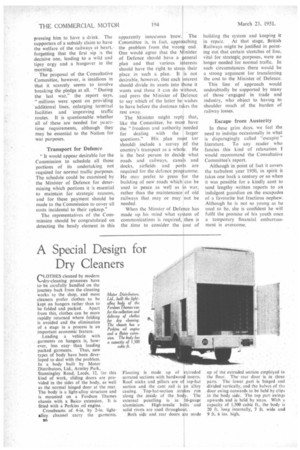Disciples of Pangloss
Page 39

Page 40

If you've noticed an error in this article please click here to report it so we can fix it.
PANGLOSS preached the doctrine that everything that happens in this world is for the est, and there is some excuse for hinking that members of the Central 'ransport Consultative Committee re his disciples. The Committee's Itest report to the Minister of Transort is tinged with a determination to )0k on the bright side that seems at imes a little excessive, if not forced.
The opening sentences set the tone. ley state that twice as many epresentations were received from Lsers last year as the year before. he normal conclusion to be drawn min this might be that the increase n the number of complaints lemonstrates a corresponding lecrease in tli`eefficiency of the :ommission, which is the subject of he complaints.
The report will have none of this; Is own interpretation is that "users Lre gradually becoming more aware if the existence of our Committee." dr. Barnes rnight,eare to try that one iext time the Commission is pilloried n Parliament.
Ample Criticism Apart from evidence given to the -2.ommittee, it is no secret that transsort users during the past year have lot been sparing in their criticisms. Ihe Committee might with advantage lave made some comment on this )henomenon, but its policy has been, )roadly speaking, as laid down by he Minister "that minor complaints 'rem the public should normally be iealt with by the Executives without ntervention, leaving us with the -reedorn and authority needed for leafing with the larger questions."
The danger that such a policy may ead merely to the formulation of platitudes has not been altogether ivoided, After all, the Committee .:annot discuss the pros and cons of iationalization. It must be careful keep its comments within the framework of the Transport Act.
What it has to say, therefore, on he 16;1-per-cent. increase in railway t'reight rates is almost exactly what Dne would have expected from such 1. Committee. If the railways are to tharge more they should give a better 3ervice. Any business that becomes Id-fashioned has to buck its ideas up to survive and the Commission must do the same. Otherwise (with a momentary baring of the teeth) "the use of C-licence vehicles will progressively increase." The Commission should ' close down unremunerative lines and bring the rest of its equipment up-to-date. If any part of the railways has to be kept in running order solely for military reasons, the Government should pay for it.
According to the report, the representatives of the Commission on the Consultative Committee (Oh yes! the Commission is represented) "dissociated themselves" from this last recommendation. Whatever
faults critics may find in the Commission, credit is due to Lord Hurcomb for his determination not to take the easy way out of the railway problem by asking for a subsidy. He realizes that to become a State pensioner is to admit defeat, and that all incentive to make the railways pay would disappear if the Treasury were to guarantee the deficit.
He must feel on occasions such as this like the reformed toper whose well-meaning friends are continually
pressing him to have a drink. The supporters of a subsidy claim to have the welfare of the railways at heart,' forgetting that the first sip is the decisive one, leading to a wild and tipsy orgy and a hangover in the morning.
The proposal of the Consultative Committee, however, is insidious in that it scarcely seems to involve breaking the pledge at all. "During the last war," the report says, "millions were spent on providing additional lines, enlarging terminal facilities and improving traffic routes. It is questionable whether all of these are needed for pe..tcctime requirements, although they may be essential to the Nation for war purposes.
Transport for Defence "It would appear desirable for the Commission to schedule all those portions of its undertaking not required for normal traffic purposes. The schedule could be examined by the Minister of Defence for determining which portions it is essential to maintain for strategic reasons, and for these payment should be made to the Commission to cover all costs incidental to their upkeep."
The representatives of the Commission should be congratulated on detecting the heady element in this apparently innocuous brew. The Committee is, in fact, appr aching the problem from the wron end. One would agree that the Minister of Defence should have a eneral plan and that various i terests should have the right to stre s their place in such a plan. It is not desirable, however, that each nterest should divide its assets into ose it wants and those it can do ithout, and press the Minister of efence to say which of the latter he wishes to have before the dustman t es the rest away.
The Minister might reply that, like the Committee, he mu t have the "freedom and authority needed for dealing with the larger
questions." His plan m St (or should) include a survey of the country's transport as a whole. He is the best person to decid what roads and railways, cana s and docks, airfields and nor s are required for the defence prog amine. He may prefer to press or the building of new roads which can be used in peace as well as n war, rather than the maintenance of old railways that may or may not be needed.
When the Minster of Defe ce has made up his mind what sy tem of communications is required, then is the time to consider the ost of building the system and keeping it in repair. At that stage, British Railways might be justified in pointing out that certain stretches of line, vital for strategic. purposes, were no longer needed for normal traffic. In such circumstances there would be a strong argument for transferring the cost to the Minister of Defence.
This line of approach would undoubtedly be supported by many of those engaged in trade and industry, who object to having to shoulder much of the burden of railway losses.
Escape from Austerity
In these grim days, we feel the need to indulge occasionally in what is disparagingly called "escapist" literature. To any reader who fancies this kind of relaxation I would recommend the Consultative Committee's report.
Although in point of fact it covers the turbulent year 1950, in spirit it takes one back a century or so when it was possible for a kindly aunt to send lengthy written reports to an indulgent guardian on the escapades of a favourite but fractious nephew. Although he is not so young as he used to be, she is confident he will fulfil the promise of his youth once a temporary financial embarrassment is overcome.




















































































